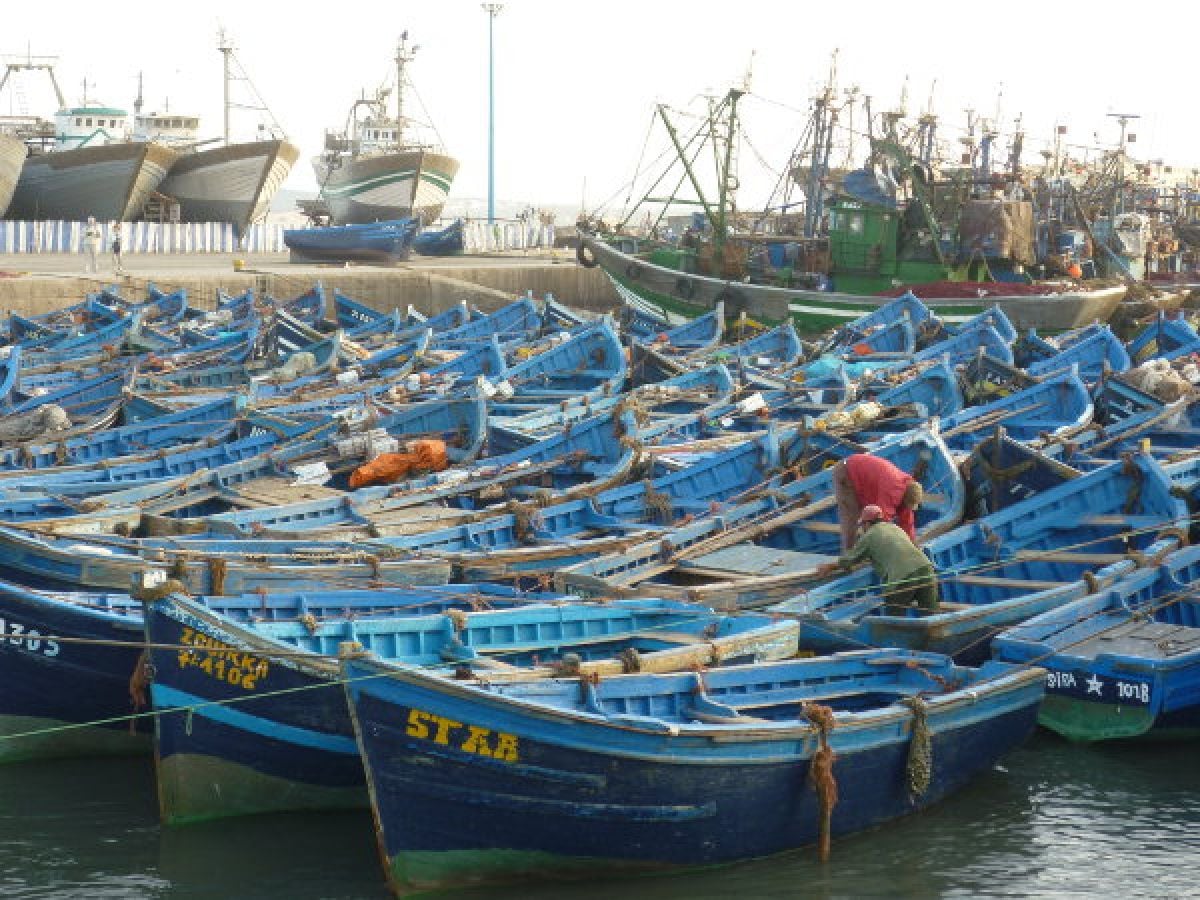
Where are you from, Lynn, and what are you doing nowadays?
A civil servant and diplomat for 13 years, in 2012 I took a voluntary redundancy and moved to Morocco to be with my partner and establish a new rhythm in my life. I wanted to start a business and live in the sun. Over the last 3 and a half years, I have built a business as a published freelance author and travel writer. I also work with local non-profits and as a virtual PA and marketing consultant. In this way, I have built a totally portable new career.
We live in Essaouira, a town on Morocco's Atlantic Coast which is famous for sardines, kite-surfing and gnaoua music. You can read about my life in Essaouira and pick up plenty of tips for visiting or living there on my blog, "Maroc-o-Phile".
Why did you choose to expatriate to Morocco?
I first visited Morocco in 2001. I found the people incredibly hospitable, the architecture and crafts inspiring and the colors dazzling (the blue skies, sunsets in the Sahara, the spices and handwoven rugs...) I stayed in a riad (Moroccan townhouse) in Essaouira over the new year into 2002 and there began my love affair with Essaouira and my dream of having my own place in Morocco. Regrettably, my next visit to Morocco wasn't until 2009 and I didn't return to Essaouira until 2011. However, on that trip I met the man who is now my husband and as our relationship grew, I realized that a life in Essaouira could be the change I was looking for.
As a British national, what where the procedures you had to follow to move there?

It is relatively easy to live in Morocco without becoming a formal resident, although it is necessary to leave every 3 months (or every 6 months if you can get an extension) to renew the tourist stamp in your passport (EU nationals don't need a visa). I was able to become resident through marriage, but normally foreign nationals need to have a fixed address and prove a certain level of income or earning potential to be granted residency.
How long have you been in the country?
I moved to Morocco in September 2012. Prior to that, I visited every 6 weeks-3 months to get a feel for the place and see my partner.
What surprised you the most at your arrival?
Although I have lived and worked all over the world, I was surprised at the level of culture shock I experienced living in Morocco. The hardest part of living and working in small town Morocco was the lack of entertainment or friends when I first moved there and started working. When you are adjusting and going through culture shock, it places an incredible strain on your relationship if you don't have your usual support network and distractions around you to help you take time out to relax. Fortunately, I soon made firm friends and got a lot of support from my husband and his family.
Was it difficult to find accommodation there? What are the types of accommodation which are available there?
It is not difficult to find rental accommodation or property to buy in Morocco, although the standards or styles are not necessarily what Europeans or North Americans are used to. Morocco has experienced a property boom in the last 10-15 years. Foreign buyers have contributed to a renaissance of the medinas (walled old towns) which has encouraged the development of many new businesses, cultural events, restaurants and cafés. Many who bought and renovated old town-houses (riads, with an internal courtyard or garden) and converted them to guest houses. Outside the medinas, modern apartments are the usual form of accommodation. The influx of foreigners seeking business opportunities or second homes in the sun has forced up prices for locals, although in many parts of Morocco, properties or rents are still much cheaper than in more "developed" countries.

Is it easy for an expat to find a job there?
I was fortunate to work for the High Atlas Foundation, a US-Moroccan non-profit working in the field of human development. Alongside this, I built my reputation and client base as a freelance travel writer, social media manager and virtual PA. I have written for several travel agency clients as well as Fodor's guide books and published my own e-guide to Essaouira, The Best of Essaouira.
Tourist visas do not allow foreigners to be employed in Morocco. The country has high unemployment and so in order for non-nationals to work legally there, it is necessary either to work as a consultant from your home country (if your country of origin's tax rules allow), set up a company (relatively straightforward) or for an employer to prove that there is no-one in the local labor market who could fulfill the role. This can be a lengthy process, although multinationals and specialist agencies are used to it.
How do you find the local lifestyle?
The Moroccan lifestyle is pretty laid back, which can come as a wonderful relief compared to the time-pressured rat race of home. Or it can be incredibly infuriating if you are used to getting things done to a schedule. As with any expat lifestyle, it is necessary to be flexible and adapt.
Moroccans are generous people and are always happy to share their time, food and ideas with visitors. This is particularly true in rural areas where there is little contact with foreigners. Moroccans derive a sense of pride and happiness from helping out travelers and those in need of assistance, even when they may have little to give. I have been welcomed into the families of not only my husband, but also many Moroccan friends.
Have you been able to adapt yourself to the country and to its society?
Yes and no. Working in the non-profit sector in a developing country has been incredibly rewarding - especially my work with local young people - it can also be extremely frustrating. Many people in the sector do not have professional skills (time management, interpersonal skills, communication and computer skills) that we take for granted at home.
Also, the idea that you might volunteer, ie work for free, is an anathema to many who may have large families with limited earning potential. As a result, many people get involved in the non-profit sector looking for a salary, or at least a kickback. The High Atlas Foundation works to train local people to take charge of their own destinies.
Change is slow in Morocco, and some interests are incredibly entrenched. The people at the bottom of the pile find it hard to climb towards the top. Helping these people has made my life fulfilling and helped me integrate into the local society. However, there have been days where I felt I was swimming upstream, and that gets tiring!

What does your every day life look like in Essaouira?
Three of the pleasures of life in Essaouira are the sun, the beach and the relaxed pace of life. If I don't have pressing work or deadlines, I like to walk along the beach in the morning with friends and enjoy a mint tea or nouss-nouss coffee (nouss-nouss means 'half and half' - half coffee and half hot milk) in a beachfront cafe.
Personal and professional life in Essaouira revolves around cafes. If I can't find a key work contact in his office, I'll find him doing business in a nearby cafe. The long lunch break is also important: Essaouira is a small city, so everyone goes home for lunch and a siesta in the middle of the day. I spend time in the medina catching up with friends and checking out new businesses for my blog and updates to my e-guide to Essaouira.
In the evenings, we might head into the medina to meet friends in - you guessed it - a cafe. Sometimes, I cook at home and invite friends over, sometimes we let one of the community kitchens do the work. We buy the ingredients for our dinner in the souks (markets) and leave them in the kitchen for the cook to work his magic. A couple of hours later, we come back for our bespoke meal!
Any particular experience in Morocco you would like to share with us?
We got married in Morocco. Our "mariage mixte" was quite the craziest paper-chase ever. Our file of several dozen documents had to be passed from the judge to the neighborhood-level administration to the provincial administration to the police and back again. Connections are everything in Morocco and luckily, through my work and my husband's, we knew a whole lot of local officials.
The icing on the wedding cake, so to speak, was signing our marriage document (or rather the blank piece of paper on which it would later be printed) in a... garage! The notary had lost his office when the courthouse was demolished for renovation and so we had to seal the deal in his temporary accommodation! After all the waiting and stress about the formalities, we enjoyed celebrating with friends and family - first Moroccan style at my in-laws' house and later Western-style with a pool party!
What is your opinion on the cost of living in Essaouira? Is it easy for an expat to live there?
The largest expat group in Morocco is the French. They are well-networked and have many structures (as well as a common language) to facilitate life in Morocco. I would say that my friends are 50/50 Moroccan and expat, thanks to my husband and his family. My expat friends are Belgian, Australian, Polish, Italian, Spanish, German, British and French. There are many expat groups on Facebook and to facilitate networking, some friends and I created one for Essaouira. We use it to share information, seek advice and organize events and get-togethers. In many parts of Morocco, you really have to create your own fun!
Life in Morocco is cheap, but Essaouira has attracted many foreign residents who have pushed up prices - particularly for property. No-one understands supply and demand better than a Moroccan salesman! If you live like a local, however, you can keep other costs low. However, if you shop in the new French-owned supermarket and eat out regularly at the crop of excellent foreign-owned restaurants, you will spend pretty much as much as you do back home. My biggest expense is airfares. If I want to catch up with friends and family outside of Morocco, it makes a big dent in my budget.

How do you spend your leisure time?
With a population of 70,000 inhabitants, Essaouira is a small city by Moroccan standards, a market town by British reckoning. It has some great music and cultural festivals through the year, but no cinema, theater, concert hall or other distractions I was familiar with from home. Slowly, however, a vibrant cultural life is emerging, thanks to local organizations such as the Essaouira-Mogador Association which host exhibitions, a small library and film nights and the local branch of the French Institute.
On the many evenings when there is no organized event, life revolves around home, food or cafes. When we have a few days off, my husband and I enjoy exploring the surrounding countryside, the markets and beaches or traveling to Marrakech for a dose of big city life. You can read more about our adventures on my blog.
Your favorite local dishes?
There is a lot more to Moroccan food than tajines (stews cooked on a stove top or charcoal in a conical-lidded earthenware pot) and couscous. The fresh fish in Essaouira is fantastic, especially sardines fresh from the quayside. I also love the salads made with cooked vegetables such as roasted peppers, boiled carrots or char-grilled courgettes. These are quite time-consuming, however, so you have to hunt them down - the cheap and cheerful tourist restaurants don't serve them.
What do you like the most about Essaouira?
The pace of life, the warmth of the local people and the opportunity to live by the ocean are my favorite aspects of life in Essaouira.
What do you miss the most about your home country?
Coming from a city like Edinburgh, I miss the sheer diversity of cultural, creative and social activities. Of course, I also miss my friends and family, although the flight is only 3 and a half hours, which makes it easy to pop back every once in a while.
What has motivated you to write your blog "Maroc-o-Phile"? How does it help?
I created the maroc-o-phile website as a means to share my passion for Morocco and specifically Essaouira with others. It was intended both as a means for friends and family to keep up with my adventures and as a platform for a future business project. At first, I thought that business would be a B&B but finally I have been able to use my blog as a portfolio of my writing about Morocco in order to gain work as a freelance travel writer with a number of travel industry clients and guide books. I hope the website fuels my readers' interest in Morocco and acts as a useful resource for those planning to travel here - either on holiday or to stay for a longer period.
Would you like to give any advice to soon-to-be expatriates in Morocco?
Morocco is a great place to come on holiday or for an extended stay to "get away from it all". It is close to Europe but seems like another world. However, it is a developing country and what you find charming as an un-invested tourist may become irritating when you actually live here. I always recommend that people spend a longer period living in their chosen town or city to see if they really enjoy the lifestyle before moving here permanently. And if you are thinking to set up a business in Morocco, consider carefully the risks and opportunities and research your market very carefully.
What are your plans for the future?
I am actually just about to head back to Essaouira after an extended stay in the UK during which I had a baby. This will be our first trip back as a family of three to introduce our son to his Moroccan family. In future, we hope we can develop a lifestyle which enables all three of us to benefit from the best of both worlds so that our son can get to know both of his parents' cultures, languages, families and home-towns.



















